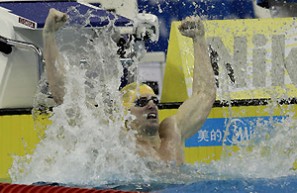'An iconic roster': LeBron, Steph, KD headline all-star cast for Team USA's shot at Olympic glory
LeBron James is going back to the Olympics for the first time in 12 years. Steph Curry is headed to the games for the…

There are only 109 days to go before the opening ceremony of the London Olympic Games, the greatest show on earth.
Organisers are expecting 205 nations numbering close to 11,000 athletes to compete in 26 sports for 302 gold medals.
A far cry from the first of the Modern Olympics in Athens in 1896 where 14 nations competed, including Australia, with 241 all male athletes as women were banned, competing in nine sports for 43 gold medals.
I’d always admired the vision of Baron Pierre de Coubertin, the founder of the Modern Olympics, until it emerged he was the reason why women were banned from competing in Athens.
“They are impracticable, uninteresting, unaesthetic, and incorrect,” was de Coubertin’s reasoning. He was lucky some woman didn’t assassinate him at the time.
Thankfully that line of thinking has long gone, as hurdler Sally Pearson and cyclist Anna Meares are among Australia’s best bets for gold in London, outside of the pool.
As usual, I will be glued to the track and the pool, where the coverage will be massive.
My first recollections of the Games was in 1948 as a nine-year-old, catching a tram across the Sydney Harbour bridge then walking to the top of the Wynyard ramp to the continuous newsreel, recalling television in Australia didn’t start until the 1956 Melbourne Olympics.
I watched Merv Wood win the single sculls, and John Winter the high jump, and remember being in awe that two Australians were the best in the world.
Until Herb Elliott blitzed the 1500 track field at the Rome Olympics in 1960. What a superb athlete who ran with such consumate ease and grace, never beaten over the 1500 or the mile, setting world records in both – and breaking the four-minute mile barrier 17 times when it was unique.
But Rome was the ultimate. Elliott beat Frenchman Michel Jazy by 30 metres, still the widest margin in Olympic history for the event.
His time of 3.35.6 not only smashed his own world record, but was so spectacular he would have won 1500 gold at the 1964, 1972, 1976, 1980, 1988, 1992, and 1996 Games – 36 years later.
Despite being on top of the world, Elliott retired at 23 after Rome saying he had nothing more to prove.
He is the greatest track athlete I’ve ever seen, Even the phenomenal Usain Bolt has been beaten by Tyson Gay over the 100.
Herb Elliott was never beaten by anybody, anywhere.
In the same breath, Dawn Fraser is the greatest swimmer. She won the 1956, 1960, and 1964 Olympic 100 freestyle, and would have won again in 1968, and 1972 had she not run foul of the Australian Swimming Union. Found guilty of nicking the Emperor’s flag from the Tokyo Palace in 1964, Dawn was innocent, but the suspension ended her stellar career.
The real reason, there were a mob of snobs running swimming at the time. Dawn was from the “wrong side” of the track in Balmain. Had she lived in the northern or eastern suburbs, Dawn Fraser would be the only Olympian in history to have won the same event five times on the trot.
And like Herb Elliott be among the elite of the elite.
Marjorie Jackson, and Shirley Strickland in 1952, and Betty Cuthbert in 1956 and 1964 went on a track gold rush the likes of which have never been repeated since by Australians.
Cathy Freeman was another Australian who stopped the nation at the Sydney 2000 Games, majestically striding to victory in the 400 track final, setting off a reaction to match capturing the Americas Cup in 1983, ending 132 years domination by the USA.
In the pool, Australia won every freestyle event in Melbourne 1956. No country has ever matched that feat since.
Ian Thorpe’s record five golds at the 2000 and 2004 Games, in a career that set 13 individual world records; Kieren Perkins and Grant Hackett dominating the 1500 freestyle from the 1992 to 2004 Games as world record-holders and a constant stream of Australian girls including Dawn Fraser and Shane Gould showing the way.
Outside of Australians, the 14-year-old Romanian pocket-rocket gymnast Nadia Comaneci’s extraordinary seven maximum 10s in 1976, the first in history; Mark Spitz’s record seven gold medals in the Munich pool in 1972, only to be broken by another American Michael Phelps with eight golds in Beijing 2008, and Michael Johnson’s history-making 200-400 track double in 1996.
On the track super-human feats, none more so than Russian Emil Zatopek in 1952, winning the 5000, 10000, and marathon, at his first attempt. To keep it in the family, Zatopek’s wife Dana won javelin gold on the same day as the 5000. That feat has never been matched.
Finland’s Lars Viren won the 5000-10000 double at the 1972 and 1976 Games, and another Russian Vladimir Kuts with his 5000-10000 double in Melbourne 1956.
I mention Kuts for a very special reason. Sitting in the crowd was an 18-year-old Herb Elliott who was so inspired by Kuts he immediately gave up his cigarette-smoking beer-drinking partying life to dedicate himself to the track.
We all know the rest.
So bring on London 2012, where there will be many more magic moments for the memory bank.